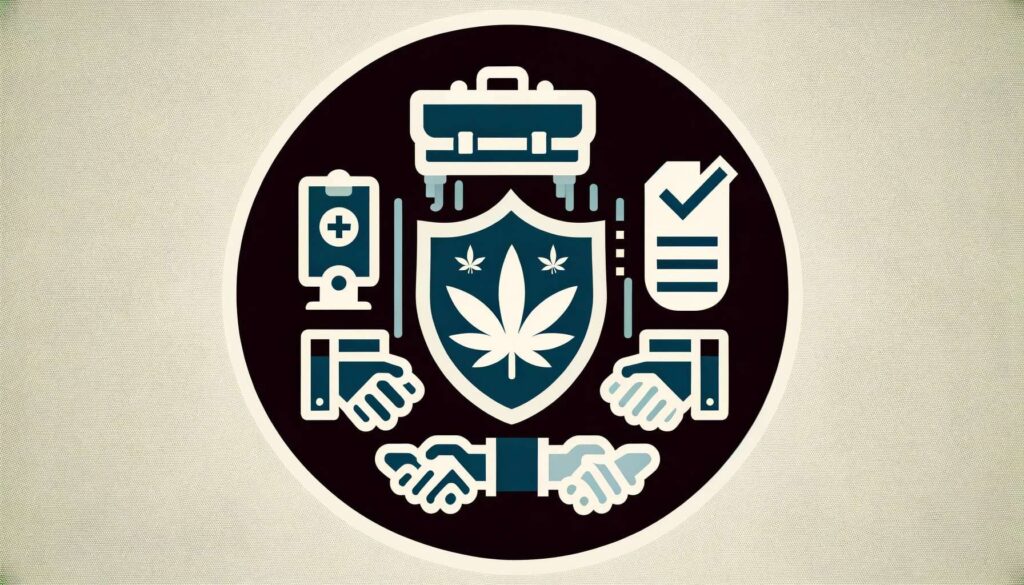- [email protected]
- (619) 304-4004
New York’s workplace laws increasingly protect medical marijuana users, limiting employer-mandated cannabis testing and recognizing patients as having a disability. This shift towards inclusive policies balances medical cannabis use with workplace safety and federal law compliance.
Medical Marijuana in New York

In New York, the landscape of workplace rights for medical marijuana users is evolving, marked by protective state laws and city ordinances. The New York City Human Rights Law notably restricts employer-mandated cannabis testing for job applicants, reflecting a shift towards accommodating medical marijuana in employment.
Additionally, the New York State Human Rights Law recognizes “Certified Patients” as having a disability, offering them certain workplace protections.
These developments indicate a trend towards more inclusive workplace policies, balancing the medical use of cannabis with employer rights to ensure safety and federal compliance.
For comprehensive insights, resources like Reuters, National Drug Screening, and Vedder Price provide detailed analysis on this topic.
In New York, the legal landscape for medical marijuana users in the workplace offers certain protections, although these can vary based on whether the use is medical or recreational.
Under New York Labor Law 201-d, employees are generally protected to use cannabis recreationally during their own time, off of the employer’s premises, and without using the employer’s equipment or property. This means that employers are typically prohibited from discriminating against employees based on their lawful, off-duty cannabis use.
However, there are exceptions, such as conflicts of interest related to the employer’s business, certain public employees, and employees engaged with specific water vessels.
Employers may have policies that distinguish employees based on their recreational activities or use of consumable products, including cannabis. This differentiation must reflect a differential cost to the employer and be communicated to employees.
The New York City Human Rights Law (NYCHRL) prohibits most employers from requiring job applicants to submit to cannabis testing, with certain exceptions, such as law enforcement and positions involving the supervision of children or medical patients.
Understanding these rights is crucial for medical marijuana patients to ensure they are not unfairly discriminated against in their workplace due to their legal use of cannabis. This knowledge empowers them to navigate their employment rights effectively and seek appropriate remedies if they face discrimination.
The New York State Human Rights Law (NYSHRL) recognizes medically prescribed cannabis use as a protected disability. This means that employers are required to provide reasonable accommodations and engage in a cooperative dialogue with employees who are certified medical marijuana users before considering termination or disciplinary actions based on their cannabis use.
However, employers still retain the right to discipline employees for misconduct in the workplace, even if it relates to their status as medical marijuana users. It’s important for both employers and employees to understand these nuances to ensure compliance with the law and protect individual rights.

Federal laws significantly impact workplace rights for medical marijuana users, primarily due to marijuana’s classification as a Schedule I drug at the federal level. This classification places marijuana alongside substances like heroin and crack cocaine, indicating a high potential for abuse and no accepted medical use.
Despite efforts like the 2021 Cannabis Administration and Opportunity Act and the Marijuana Opportunity Reinvestment and Expungement (MORE) Act, there has been no successful federal legalization or decriminalization of marijuana.
This federal status creates a complex legal landscape for medical marijuana users in the workplace, especially as state laws, such as those in New York, often conflict with federal regulations.
Employees should be aware that employer drug policies can vary significantly and are influenced by both state and federal laws. In states like New York, certain protections are in place for medical marijuana users. However, no state requires employers to allow the use of medical marijuana while working or in the workplace.
Employers may prohibit the presence of medical marijuana on their premises, with very limited exceptions. Employees should understand their employer’s specific drug policies, especially regarding the use of medical marijuana, and how these policies align with state laws.
Navigating workplace drug testing as a medical marijuana user can be challenging. Some states, including New York, restrict employers from taking adverse action against employees based solely on testing positive for marijuana. However, this does not necessarily protect employees from disciplinary actions if they are impaired by cannabis while at work.
There is currently no scientifically valid test to confirm marijuana-caused impairment at the time of testing, which complicates matters. Employees should understand their rights under state law and communicate with their employers about their medical marijuana use, especially if it could impact their work.
Deciding whether to disclose medical marijuana use to employers is a personal decision and depends on various factors, including the nature of the job, the employer’s policies, and the legal framework in the state.
In New York, where medical marijuana use is protected under certain conditions, it might be beneficial for employees to disclose their use to facilitate reasonable accommodations.
However, employees should carefully consider their specific circumstances and the potential implications of such disclosure at their workplace.
Effective communication is crucial in the workplace, especially for medical marijuana users in New York. It helps in clearly understanding and adhering to the state’s policies regarding cannabis use. Employers and employees need to be aware of the legal provisions for cannabis use, both in and out of the workplace, as outlined by New York’s Marihuana Regulation and Taxation Act (MRTA).
Employees should openly communicate with employers about their medical marijuana use, especially where it concerns job performance and safety. This approach ensures that all parties understand their rights and responsibilities, thus fostering a compliant and respectful workplace environment.
Ensuring non-discrimination in the workplace is a collective responsibility. Employers must adhere to the laws stipulated by the MRTA, which prohibits discrimination against employees based on lawful, off-duty cannabis use. They are required to create and enforce policies that respect these laws, while also ensuring workplace safety.
At the same time, employees should be aware of these protections and uphold their end by complying with workplace policies, especially regarding impairment and safety. Open communication and mutual understanding between employers and employees are key to maintaining a non-discriminatory environment.
In cases of workplace incidents related to medical marijuana use, employees in New York should first understand what constitutes impairment under the state’s laws. They should be aware that employers are allowed to take action if an employee shows clear, observable signs of cannabis impairment that affect their job performance or workplace safety.
If such an incident occurs, employees should engage in open dialogue with their employers, explaining their medical marijuana use and how it relates to the incident.
It’s essential for employees to know their rights under state law and seek proper guidance or legal advice if they feel they are being unfairly treated.
Employees in New York seeking legal assistance for workplace issues involving medical marijuana can start by consulting with attorneys specializing in employment law or cannabis law. Many law firms provide guidance on navigating the complexities of cannabis-related workplace policies.
Additionally, state resources like the New York Department of Labor and cannabis advocacy groups can provide guidance and support in understanding one’s rights and the appropriate steps to take in seeking legal assistance.

In New York, veterans using medical marijuana are afforded certain workplace rights under the Marihuana Regulation and Taxation Act (MRTA). This legislation restructured state labor laws concerning cannabis use, ensuring that employees, including veterans, are not discriminated against based on lawful, off-duty cannabis use.
However, the complexities arise with the intersection of state and federal laws, as marijuana remains a Schedule I controlled substance at the federal level.
For veterans, particularly those working in federal government roles or in industries highly regulated by federal laws, the situation is more nuanced. Federal employers or contractors may have stringent drug policies due to the conflict between federal and state laws. This means that veterans using medical marijuana, even legally under New York state law, may face challenges in these work environments.
Yes, New York law protects employees who legally use medical marijuana outside of work hours and off the employer’s premises. The New York State Labor Law Section 201-D prohibits discrimination against employees for their legal use of consumable products, including medical marijuana, under specified conditions.
Employers cannot fire an employee solely for using medical marijuana legally outside of work hours and off the employer’s premises. However, if the use impairs the employee’s ability to perform their job safely or if it violates federal law or affects federal contracts or funding, the employer may have grounds for termination.
New York law does not specifically require employers to accommodate medical marijuana use in the workplace. However, employers are prohibited from discriminating against employees for legal use outside of work. Accommodations, if any, would depend on the employer’s policies and the nature of the job.
Disclosure of medical marijuana use is not explicitly required by New York law. The decision to disclose is personal and should be based on the workplace environment, the nature of the job, and the potential impact on employment. Legal advice may be sought in complex situations.
While medical marijuana use is protected outside of work hours, employers in New York may still enforce drug testing policies. A positive drug test for marijuana can be problematic, especially in safety-sensitive jobs. Employees should understand their employer’s drug testing policy and how it intersects with their medical marijuana use.
In New York, workplace rights for medical marijuana users are governed by a balance between state law protections and employer obligations. Under Section 201-D of the New York State Labor Law, employees are protected against discrimination for legally using medical marijuana outside work hours and off employer premises.
However, these protections have limits, especially if usage impairs job performance or conflicts with federal law. Disclosure of medical marijuana use to employers is a nuanced decision, dependent on individual circumstances and workplace policies.
Employers must navigate these laws while ensuring workplace safety and productivity, often requiring clear policies and sensitive handling of medical marijuana issues. As legal and societal views evolve, staying informed and adaptable is crucial for both employers and employees in navigating this complex area of employment law.
Here are some resources where you can find more information about workplace rights for medical marijuana users in New York:
These resources can provide a more in-depth understanding of the legal landscape and employee rights regarding medical marijuana use in the workplace in New York.

A1 Marijuana Doctors is an online platform, that connects marijuana patients to marijuana doctors in their state.

A1 Marijuana doctors is an online platform that connects medical patients to medical marijuana doctors. We offer a quick & easy way to apply for a medical marijuana card in all legal states.
Social Links
Contact Us
Quick Links
Trusted By




This website does not sell medicine nor controlled substances. It is a network of doctors & nurse practitioners, not a pharmacy / dispensary.
Copyright ©2023 A1 Marijuana Doctors. All rights reserved.